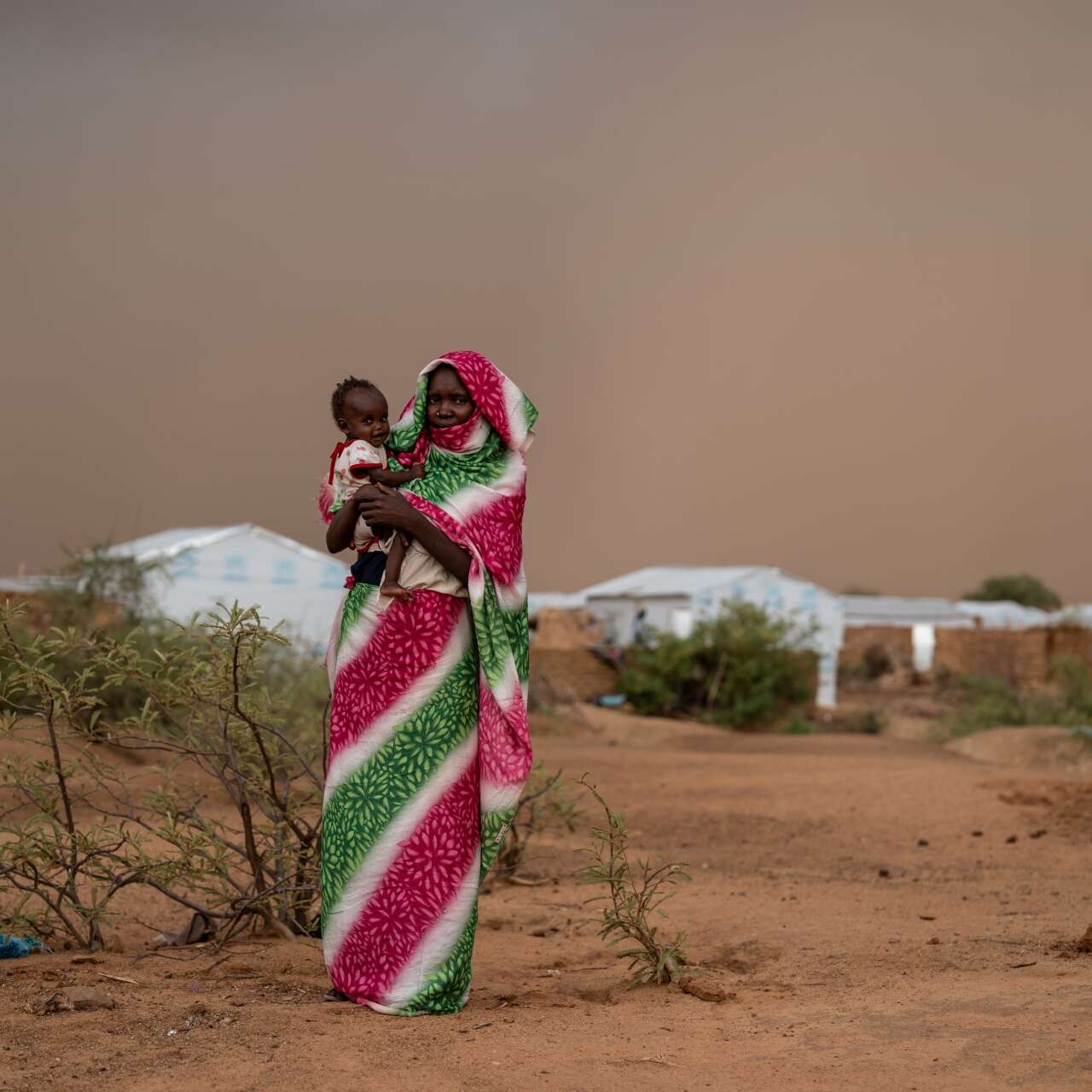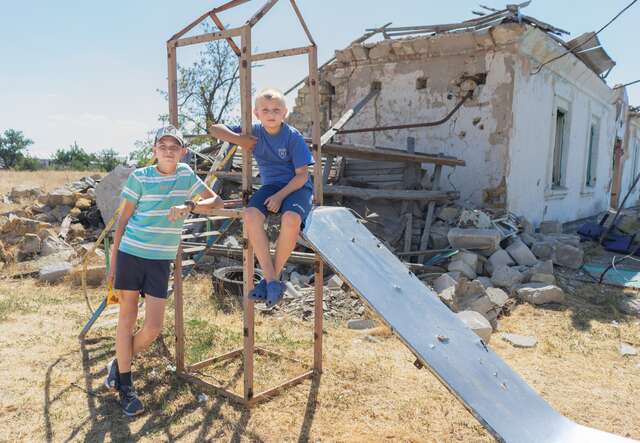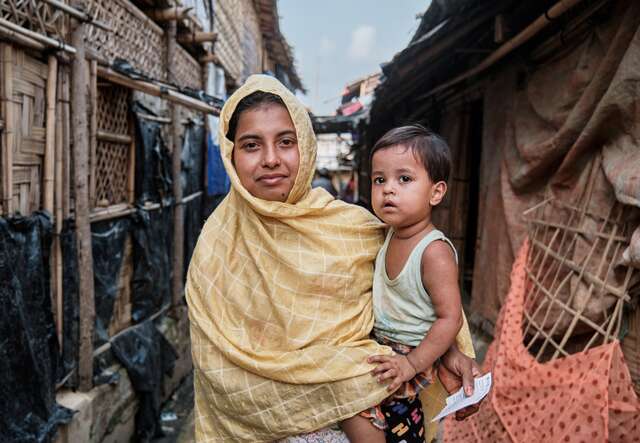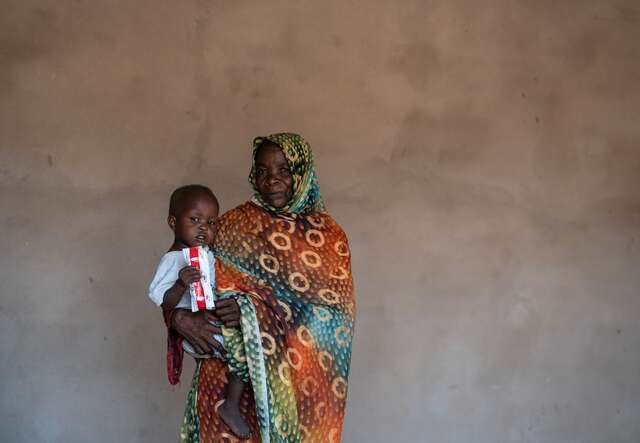
Over 122 million people are displaced—here’s how you can help
Discover why people have been displaced, where they’re finding safety and how you can support them.

Discover why people have been displaced, where they’re finding safety and how you can support them.
The world is facing a record-breaking displacement crisis: more than 122,100,000 people have been forced to flee their homes. Families have been torn apart. Communities destroyed. Futures put on hold.
World Refugee Day, observed annually on June 20, honors the courage and resilience of displaced people. It’s a moment to reflect on the hardships they face—and to take action to support them.
People like Khamissa, a Sudanese grandmother and refugee who risked her life to evacuate her grandchildren through a warzone, embody the courage of those forced to flee their homes.
Even as displacement continues to rise, humanitarian aid funding is shrinking. Against this dire backdrop, 2 million IRC clients alone have lost humanitarian services. Millions more are at risk amidst unprecedented attacks on resettlement and asylum protections. This World Refugee Day, we are calling on the public to stand with Khamissa and millions more who need protection, safety and hope. Whether through advocating for change, volunteering locally or offering direct support, we all can make a lasting impact.
So, where are people fleeing from? Where are they going? And how can you help?
The UN Refugee Agency reports that over 122 million people are now displaced around the world. This number has doubled in the past decade, highlighting a bleak global reality, especially as aid funding is being cut.
This figure includes 31 million refugees—people who have fled their country to escape war, persecution or disaster. Over 8 million are seeking asylum, hoping to reach safety and rebuild their lives in a new country. Still, 73.5 million remain displaced within their own countries as internally displaced people (IDPs), often enduring dangerous and unstable conditions
People are displaced by war, persecution and humanitarian crises that make it unsafe for them to stay in their communities. One-third of all forcibly displaced people originate from just four war-torn countries: Afghanistan, Sudan, Syria and Ukraine.
Places facing extreme rates of hunger and malnutrition, like the Occupied Palestinian Territory and the Democratic Republic of the Congo, are also experiencing massive levels of displacement.

Despite common misconceptions, most refugees are not resettled in wealthier nations. In fact, 73% of refugees and other displaced people in need of international protection are hosted by low- and middle-income countries—nations that are often grappling with their own challenges. More than two-thirds move to countries neighboring theirs. And in 2024, nearly 10 million displaced people returned to their homes, often to communities still recovering from conflict or disaster.
For example, despite ranking near the bottom of the UN’s humanitarian development index, Chad hosts 1.3 million forcibly displaced people, including 800,000 Sudanese who fled a brutal civil war.
Many displaced families live in overcrowded camps or informal settlements, where access to clean water, health care, education and jobs is extremely limited. That’s why the IRC works in these settings, delivering lifesaving services and helping people survive, recover and rebuild their lives.
Despite the immense needs of displaced people and the limited resources of the countries that host them, some wealthier nations are turning away. The Trump Administration suspended the United States Refugee Admissions Program (USRAP)—a decision that harms the American economy, reverses 45 years of bipartisan support for USRAP and comes as a detrimental blow to refugees in search of safety.

Imagine being forced to leave everything behind—your home, your loved ones, your entire way of life—and not knowing if you’ll ever see safety again.
Khamissa has lived through this more than once. Over 20 years ago, she fled the war in Darfur and found refuge in Chad’s Farchana refugee camp. There, she built a life with her husband and raised her children—including a daughter who later returned to Sudan to start her own family.
Then, in 2023, Sudan’s civil war erupted. Khamissa’s daughter and 11-year-old granddaughter were killed, leaving behind four orphaned children. At 70 years old, Khamissa made a brave decision: she would walk into Sudan to save her grandchildren.
For two days, Khamissa traveled on foot to reach them. The youngest, baby Djaba, was entirely dependent on breastmilk. Without his mother, he became gravely ill with severe acute malnutrition. In desperation, Khamissa even tried to breastfeed him herself.
“We treated him with great difficulty,” she recalls. “We tried with all our might to keep him alive.”
Back in Chad, Khamissa rushed Djaba to the IRC’s health center in Farchana. After receiving specialized treatment for malnutrition, he began a full recovery.
Life remains difficult for Khamissa and her grandchildren. She washes clothes for other families in the camp just to afford food. But thanks to her perseverance—and support from IRC staff—Djaba is alive and growing stronger.
“The situation is really tough,” she says. “If the IRC wasn't here, our situation would be much worse.”

Around the world, refugee families are rebuilding their lives in the face of unimaginable hardship. Many have lost loved ones, homes and livelihoods. Children are growing up in refugee camps, knowing only displacement and uncertainty. Yet, as needs grow, humanitarian funding is being cut.
This World Refugee Day, we are asking you to meet the moment. Whether through advocating for refugee rights, volunteering locally or donating, we all can make a lasting impact.
Donate: The IRC delivers humanitarian aid in more than 40 crisis-affected countries and will always remain committed to helping displaced people survive, recover and rebuild their lives. We also offer refugee, asylum and integration services at our offices across the U.S. and Europe.
In the face of humanitarian aid cuts and increased needs, donors like you are key to keeping our lifesaving programs operational.
Raise awareness: Use your voice to stand with refugees. Share posts from the IRC’s Instagram, Facebook or LinkedIn to raise awareness amongst your network and encourage others to meet the moment.
Volunteer: IRC volunteers play critical roles in helping refugees and other people affected by crisis integrate and thrive in their new communities. Search for virtual or in-person volunteer opportunities near you.
Stay informed: Read the latest from the IRC for a humanitarian perspective on current events. You can also read more about the top 10 crises the world can’t ignore in 2025 and learn more about the IRC's 2025 Emergency Watchlist.
The IRC is on the ground in more than 40 countries, responding to the world’s most urgent humanitarian crises, including in Sudan, Ukraine and the occupied Palestinian territory. We also help refugees and displaced people find safety and rebuild their lives by resettling and integrating into new communities in the U.S. and across Europe.
Founded at the call of Albert Einstein over 90 years ago, the IRC remains dedicated to helping people affected by crises to survive, recover and rebuild their lives. We consistently earn top marks by charity watchdog groups for our efficient use of donor contributions and the effectiveness of our work.
Support our mission—help crisis-affected people survive, recover and rebuild their lives.
Get connected: Follow our Instagram, LinkedIn, Facebook, X and Bluesky accounts.